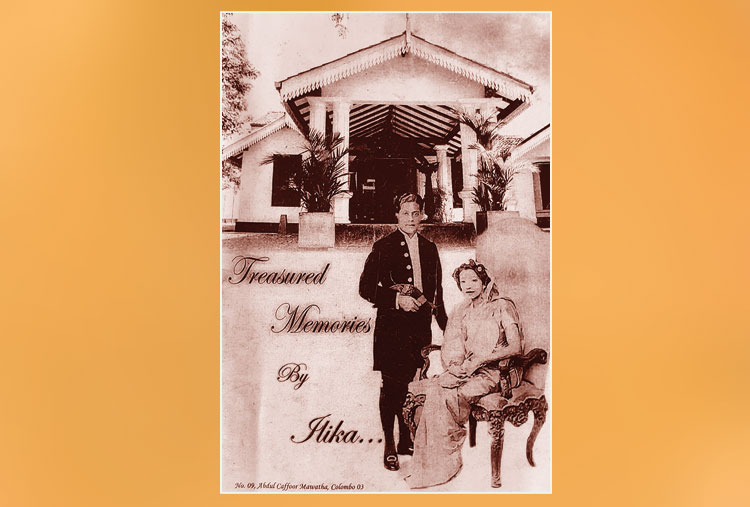FEATURES
A World we have lost

Treasured memories by Ilika Karunaratne
Reviewed by Leelananda de Silva
The sun has set on the British Empire. There are yet a few who remember its last days. Those were the days when the Anglican Church was the church of the State, and Anglican bishops mattered. Ilika Karunaratne, who writes a delightful column (Kamalka’s Brief in the Daily Mirror) comes from that kind of Anglican background, and she has now put down some of her memories in a little book “Treasured Memories”.
It is autobiographical but not an autobiography. It could be a model for others to follow. Let us look at Ilika’s ancestors, as she is very much concerned with them. She has every right to be proud of them. On her paternal side, her great grandfather was C.H. de Soysa, arguably the greatest philanthropist Ceylon and Sri Lanka has seen. On her maternal side, her grandfather was Sir Henry de Mel, a great landowner. The town of Melsiripura, in the Kurunegala district is named after him.
Bishop Harold de Soysa, the Head of the Anglican Church in Colombo, in the 1950s was Ilika’s father’s cousin. Bishop Lakdasa de Mel, Bishop of Kurunegala was her uncle (mother’s brother). Ilika’s father was Professor C.C. de Silva, the famous peadiatrician. Ilika refers to her marriage to Chandra Karunaratne, who was in politics and later a deputy minister, as encountering opposition from various sources, as he was a Buddhist and not from the same social circles. Ilika was brave to have withstood those pressures and enjoyed a very happy marriage.
Right through this little book there lurks Ilika, the Anglophile. Apart from being a member of the Anglican Church, she obviously has a great affinity with England and its culture. She was presented as a debutante to the Queen. “My presentation to Queen Elizabeth as a debutante at Buckingham Palace, was yet another unforgettable experience, being the third generation of my family to have had this honour”.
She celebrated her 21st birthday there. She got married in England. She is familiar with England in many other ways and one feels that she was more at home in that early twentieth century milieu. She belongs to a generation which is more or less on the verge of extinction. With her marriage to Chandra Karunaratne, and even before that Ilika was surprisingly involved in local politics.
(Though she does not mention it one of her maternal uncles was R.F.S. de Mel, Mayor of Colombo). She has always been with the UNP and member of its working committee. She had a close association with Dudley Senanayake, and J.R. Jayewardene. There is a most interesting reference to J.R.J. “A mistake he made though, which he admitted to Chandra, my son Kishan and me, when we visited him after he retired from the Presidency, was to bring in the presidential system”.
Ilika has known our President, Ranil Wickremesinghe from his baby days. She was his teacher at Bishop’s College. “Soon after I left school, I assisted as a trainee teacher in the kindergarten at Bishop’s College, for a while. One of my first little pupils was Ranil Wickremesinghe. I will recall his tall, stately beautiful mother, Nalini Wickremesinghe bringing him to school. He was a friendly, affectionate, handsome little boy, a far cry, from the rather reserved man he is now.
He would call me even when I gave up teaching, asking me to return as he didn’t like the new teacher!”I had always thought that King Sri Wickrama Rajasinghe was the only important Sri Lankan visitor to Mauritius. That is wrong. Ilika spent some time in Mauritius where her father, Prof. C.C. de Silva had an assignment. Prof. C.C. had been a fellow student in London with the then Prime Minister of Mauritius, Ramgoolam. At that time, Dr. N.M. Perera also visited Mauritius, as Ramgoolam was a friend from their London student days. A snippet of old empire and Commonwealth connections.
Ilika’s book brings to mind and memory, the influence that the British had in Ceylon even after Independence in 1948. That influence waned gradually over the next 30 years. The English medium of instructions was given up in the early 1960s.
The monarchy was given up in 1972. Appeals to the Privy Council ended the same year. In 1978 the Westminster model of parliamentary government was abolished. Thereafter, British influence gradually waned almost to extinction.
But then we should look at England. So beloved of several generations of Sri Lankans. England and Britain are no longer what it was when Ilika was a debutante at Buckingham Palace. The aristocracy has more or less vanished. The Royal family is no longer the head of the aristocracy. The Prime Minister of Britain is a Hindu. The Mayor of London is a Muslim, and the Scottish First Minister is a Muslim. The Royal family is more commoner than it was.
The current Princess of Wales comes from the middle class, unlike Diana, who came from the cream of British aristocracy only 40 years ago. In London there are more Asian, Africans and Europeans than Englishmen. Ilika would now be a stranger in London.
(The book is for private circulation and not for sale)
